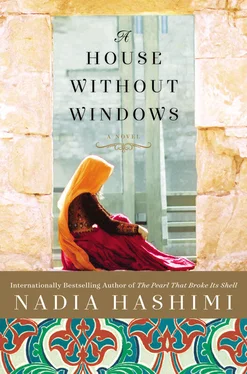It was a shame, really. Once upon a time, Zeba and her mother, Gulnaz, had been as close as a flower to its stem. Zeba had been a radiant child, a manifestation of the name her father had bestowed upon her. She would slip from her father’s lap to her mother’s side, giggling as her parents took turns tickling her tummy, kissing the top of her head, or tossing her in the air.
Zeba’s brother, Rafi, was five years older and more serious by nature. He was a simple and docile son who gave his parents neither reason to boast nor to complain.
While most of the women around Gulnaz grew round with their next child by the time the previous had taken its first steps, Gulnaz was not like any other woman. She thrived on having control — control of her emotions, her body, and her family. Her husband was content to let her exert her will. She drew much envy for that, which further fueled her need to be in command.
Gulnaz would have a child only when she wanted. Whether she did this by denying her husband’s attentions or by some trickery of herbs was not known. She simply smirked when her sisters-in-law dared to ask.
It was 1979 and the Soviet troops had started to roll into the country, the end result of a flirtation between Afghanistan and the great power that had begun when Gulnaz was born twenty years earlier.
Rafi, her firstborn, was old enough to bathe, dress, and feed himself when Gulnaz decided she was ready for a second child. Nine months after she declared her desire, Zeba was born. Gulnaz loved Zeba all the more because her cherubic existence was proof that Gulnaz was the captain of her own ship.
Afghanistan changed hands that year, one president replacing another who had either died of natural causes or had been smothered by mutinous hands. The truth would remain elusive. Since chaos breeds chaos, the new president would be replaced before the year was over. It was an inauspicious time to bring new life. Gulnaz wondered if even Zeba had been a mistake.
Imagine a home led by three different patriarchs in one year, she thought to herself. No, this kind of home could not survive, nor could a country.
We will have no more children, Gulnaz had declared to her husband and their family. No one doubted her when she made the vow. They knew, by then, that she could circumvent nature to make it so.
GULNAZ WAS A SORCERESS, A SKILLFUL TEASER OF FATE JUST AS her grandmother had been. While Gulnaz maintained that her grandmother had never taught her any of the trickery she was known for, it was obviously not true. What Gulnaz practiced was an intricate and complex art honed over generations, not one that could be picked up casually.
She hummed as she concocted, which made it seem all the more innocent to her children and husband. They, after all, only benefited from her skills. When the children burned hot with fever, she dripped holy water into their mouths and placed amulets beneath their pillows. When Rafi writhed with pain as a boil the size of a tomato grew on his calf, Gulnaz set off for the lake. She found a frog, sliced it open with a paring knife, and butterflied it onto the mass, wrapping its bleeding corpse in place with strips of fabric. Within an hour, Rafi shouted loudly. The boil had erupted and pus flowed freely down his leg. Gulnaz tossed the frog’s body outside, and Rafi’s leg was completely healed two days later. Gulnaz was as loving and devoted as any wife or mother could be — she was just a bit more potent. Her children took comfort in their mother’s magic even when it hurt.
When Rafi was six, he broke his leg. It happened the day after his aunt had commented on his remarkable height. Cursing under her breath, Gulnaz held a sewing needle over a flame and used it to pierce Rafi’s earlobe, tears in her eyes as he writhed and screamed beneath her. And until he turned fourteen years old, she left one lock of hair uncut until it reached the middle of his back.
“To protect you from nazar, ” she’d said grimly. The evil eye was powerful. These things had to be done.
The rest of the family was discomfited by Gulnaz. The cousins, sisters-in-law, and aunts bit their tongues and clung to their prayers like they were antidotes. The green-eyed beauty made them quite anxious.
Zeba sat at her mother’s side and watched as she plunged hot needles in chunks of animal fat or boiled eggs that she would leave at an unsuspecting doorstep. These habits became as routine to her as washing the bedsheets or peeling potatoes. This was life with Gulnaz. Zeba recited multiplication tables along with other children her age but understood the mathematical property even better when Gulnaz showed her how a knot threaded five times was five times as powerful in its ability to turn friction between two resentful women into a fire so angry it could burn a house down.
But Gulnaz used her powers only when necessary or when those closest to her called upon her for help. She was judicious about it because she knew it made her husband uneasy, though he never outright forbid it. Her trickery, like everything else in her life, was under her control and she could exercise it as much or as little as she saw fit.
All that changed when Zeba’s father disappeared. Gulnaz recalled a shift in her mother, a tightening of the jaw that never eased.
Zeba’s father had disappeared just as she’d learned to read. She remembered it only as a time when a string of letters made more sense than the happenings in her small home. Gulnaz told Rafi and Zeba only that their father had gone off to fight the godless communists. The children wished quietly for him to come home but quickly learned it was not a topic to discuss with their mother. When relatives did bring up his sudden departure, Gulnaz would spend the rest of the day beating the dust from the carpets or scrubbing the blackened pots with vengeance. It was best not to mention Padar, even if his absence was a window left open in the winter. The war was bloodier each day, and soon, it seemed, the martyred would outnumber the living.
Gulnaz withdrew from the rest of her husband’s family within their shared compound and pulled her children in closer, taking on the appearance of the sullen, abandoned wife. When enough time passed that some began to refer to her as a widow, Gulnaz took advantage of their assumptions. She dressed in black, drew the curtains on the windows, and spoke in hushed tones. She stayed up when the children slept and watched over them by the wan light of a flickering candle. With her children, she was cheerful and loving but only when they were alone. The children had loved their father and missed him sorely. Rafi grew more subdued than he already was by nature, emasculated by his father’s absence. Zeba, with a child’s magical thinking, believed her father would return. She’d fallen asleep to the soothing rhythm of his heartbeat too many nights to think she would never lay her head on his chest again.
Gulnaz and the children drew looks — some sympathetic, some suspicious. Gulnaz despised them equally and added those people’s names to her list of enemies. She doled out bits of retribution to them all. Sheltered by her mother, Zeba grew accustomed to being an outsider. Rafi, though quiet and reserved, became her best friend. He was the only other person in the world who could possibly understand what it meant to have Gulnaz as a mother.
WHEN A MAN’S HAD ENOUGH, HE’S HAD ENOUGH , ZEBA’S AUNT HAD once commented at a holiday dinner, as the conversation turned to a neighboring couple whose arguments could be heard from the street. The women, while clearing the dinner dishes, had been arguing that the husband was a stubborn brute deserving of his wife’s near-public berating, but Ama Ferei, her father’s sister, considered other possibilities. No wife or husband is without fault. Only those two know the truth of their story.
Читать дальше











